

Discover A Better Way of Working. The Solution We're at our best when we move between expending energy and intermittently renewing our four core energy needs: physical, emotional, mental, and spiritual.
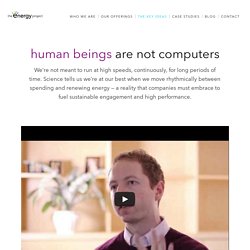
When you're intent on supplying fuel in each dimension of energy, you're creating happier people that will affect your organization’s success. The foundation of all other dimensions of energy, physical energy is comprised of sleep, fitness, nutrition, and intermittent daytime rest and renewal. Emotional energy is about learning to cultivate the specific emotions associated with high performance, because how people feel profoundly influences how they perform. Gen Z and Gen Alpha Infographic Update. We are in the midst of a generational landmark, as Australia’s “Digital Integrators” (Generation Z) began sitting their final school exams last year, and the first Generation Alpha’s begin their schooling career this year.

Below we provide an explanation about each of these generations, and some interesting facts about them. The students of our world today who are currently at school and university are the children of Generation X, the cohort that follows Generation Y, and who are born between 1995 and 2009. They are Generation Z. Generation Z are the largest generation ever, comprising around 20% of Australia’s population and almost 30% of the world’s population. Globally there are almost 2 billion of them. They are the first fully global generation, shaped in the 21st century, connected through digital devices, and engaged through social media.
Make Yourself Immune to Secondhand Stress. Over the past decade, we have learned how our brains are hardwired for emotional contagion.

Emotions spread via a wireless network of mirror neurons, which are tiny parts of the brain that allow us to empathize with others and understand what they’re feeling. When you see someone yawn, mirror neurons can activate, making you yawn, in turn. Your brain picks up the fatigue response of someone sitting on the other side of the room. Why Identity and Emotion are Central To Motivating the Teen Brain. By Emmeline Zhao For years, common experience and studies have prescribed that humans learn best in their earliest years of life – when the brain is developing at its fastest.
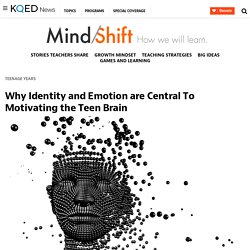
Positive Brains Are Smarter Brains. Editor's note: This post is co-authored by Marcus Conyers who, with Donna Wilson, is co-developer of the M.S. and Ed.S.
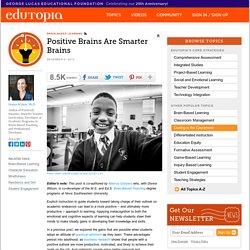
Brain-Based Teaching degree programs at Nova Southeastern University. Explicit instruction to guide students toward taking charge of their outlook on academic endeavors can lead to a more positive -- and ultimately more productive -- approach to learning. Applying metacognition to both the emotional and cognitive aspects of learning can help students steer their minds to make steady gains in developing their knowledge and skills. In a previous post, we explored the gains that are possible when students adopt an attitude of practical optimism as they learn. Vision and Mission. Collaborative for Academic, Social, and Emotional Learning (CASEL) is the nation’s leading organization advancing the development of academic, social and emotional competence for all students.
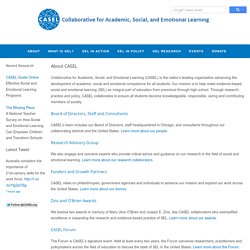
Our mission is to help make evidence-based social and emotional learning (SEL) an integral part of education from preschool through high school. Through research, practice and policy, CASEL collaborates to ensure all students become knowledgeable, responsible, caring and contributing members of society. Board of Directors, Staff and Consultants CASEL's team includes our Board of Directors, staff headquartered in Chicago, and consultants throughout our collaborating districts and the United States. Learn more about our people. Research Advisory Group. Insights-and-ideas-issue-2. What if students controlled their own learning? EdTech K–12 Magazine sur Twitter : "45% of administrators say #BlendedLearning has yielded positive results #Infographic / #EdTech. The Global Search for Education: How to Lead Well
"The existing model of collaboration between the public and private sectors limits innovation in sectors that are substantially publicly funded.
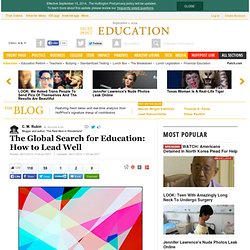
" - Esko Aho How do highly effective leaders lift their organizations to extraordinary levels of achievement? How do you they lead their people well and subsequently bring about change on a global scale? Andy Hargreaves, Alan Boyle and Alma Harris conducted an extensive seven-year global research study that focused on fifteen high-performing organizations in business, sports and education to find out the answers to these questions. Prepare to be inspired by their extensive research and their conclusions, which are the subject of Uplifting Leadership: How Organizations, Teams and Communities Raise Performance, a new book that Sir Ken Robinson predicts will "overturn many conventional assumptions about leadership. " What are the 21st century skills essential for future leaders?
Michael Fullan: 1. New digital solutions cannot be created without risk. Hi-tech playground in western Sydney takes digital natives into great outdoors. By Jessica Kidd Updated Sat 12 Apr 2014, 3:25pm AEST Many modern parents would argue it is near impossible to tear their kids away from smartphones and videogames and coax them into the great outdoors.
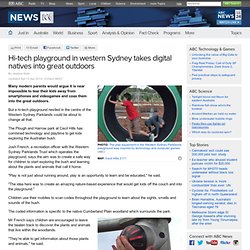
But a hi-tech playground nestled in the centre of the Western Sydney Parklands could be about to change all that. The Plough and Harrow park at Cecil Hills has combined technology and playtime to get kids exploring the Australian bush. Josh French, a recreation officer with the Western Sydney Parklands Trust which operates the playground, says the aim was to create a safe way for children to start exploring the bush and learning about the plants and animals that call it home.
"Play is not just about running around, play is an opportunity to learn and be educated," he said. "The idea here was to create an amazing nature-based experience that would get kids off the couch and into the playground. "